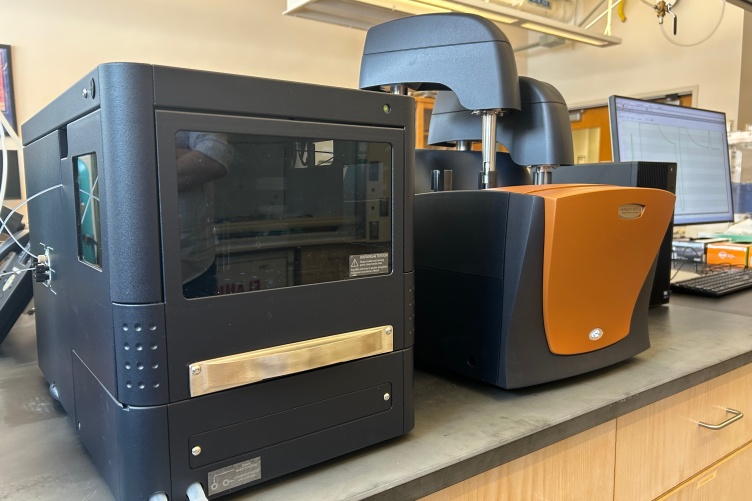Center of Integrated Biomedical and Bioengineering Research
Powerful New Research Technology Comes to UNH
https://www.unh.edu/research/university-instrumentation-centerUNH's acquisition of an automated isothermal titration calorimeter will increase research capabilities in a variety of fields. Read More-
11/21/25
American Institute of Chemical Engineers Honor Two UNH Researchers
Two UNH researchers, Professor Harish Vashisth and postdoctoral research scholar Lev Levintov, in the Department of Chemical Engineering and... -
10/08/25
Increasing the Benefits and Reducing the Risks of Pain Management Using Opioids
UNH researcher Cheryl Whistler investigated the role of gut microbiota in opioid response. She found that butyrate, whether produced by microbes or... -
10/03/25
UNH's Vashisth Receives $2.1 Million from NIH Aimed at Advancing Therapeutic Discovery
Harish Vashisth, professor of chemical engineering and bioengineering, has been awarded a five-year, $2.1 million Maximizing Investigators’ Research... -
09/14/25
UNH's Harish Vashisth Awarded $780K NSF Grant to Advance RNA Research and Train STEM Workforce
A UNH researcher will work to advance our understanding of chemical changes in RNA molecules and train STEM workforce in innovative RNA technologies...
Recent Stories
-
08/12/25 - Why Do We Lose Cognitive Ability as We Age?Adam Brockett's research is delving into the basic biology of aging, with the goal of providing insights that help people maintain cognitive function as they age. Read More
-
04/04/25 - Lab, ReimaginedDavid Needle has 900 samples of moose poop. “As one does,” quips the senior veterinary pathologist at UNH’s New Hampshire Diagnostic Veterinary Lab. Those stinky artifacts can... Read More
-
02/18/25 - Unlocking Nature’s Ice-BindersUNH scientists study antifreeze proteins to improve cryopreservation methods, aiming to revolutionize medicine, agriculture, and biotechnology with ice-binding solutions. Read More
-
08/01/24 - Two Professors Receive $4 million to Improve Wound Healing and Tissue GenerationIn a significant boost to biomedical research and ultimately human health outcomes, University of New Hampshire professors Linqing Li and Nate Oldenhuis have been awarded nearly $... Read More
-
09/27/23 - UNH's Center of Integrated Biomedical and Bioengineering Research Receives $10M NIH GrantNew $10M, Phase 2 NIH grant will help fuel ground-breaking innovations in health and disease solutions at the Center of Integrated Biomedical and Bioengineering Research. Read More
-
06/21/23 - 1 out of 4 Americans likely have Toxoplasmosis. What’s Toxoplasmosis?COLSA research examines the role that a part of the parasite Toxoplasma gondii plays in switching on and off the genes responsible for regulating infections caused by the parasite... Read More
-
05/11/23 - Bold Ideas, Better OutcomesScientific discoveries made by biomedical and bioengineering researchers at UNH over the past five years are transforming how a range of complex health conditions — from cancer... Read More
-
12/06/22 - Predicting Eye DiseaseA recently awarded $1.5 million grant from the U.S. National Institutes of Health’s (NIH) National Eye Institute will support ongoing research into retinal degenerative diseases... Read More
-
07/13/22 - Sequencing VariantsWith new funding from the National Institutes of Health, UNH wilil continue its genomic surveillance of COVID-19 variants in New Hampshire. Read More
-
06/21/22 - Dedicated to Health Disparities ResearchNutrition researcher Maria Carlota Dao, an assistant professor at the UNH College of Life Sciences and Agriculture and a New Hampshire Agricultural Experiment Station (NHAES)... Read More






























































